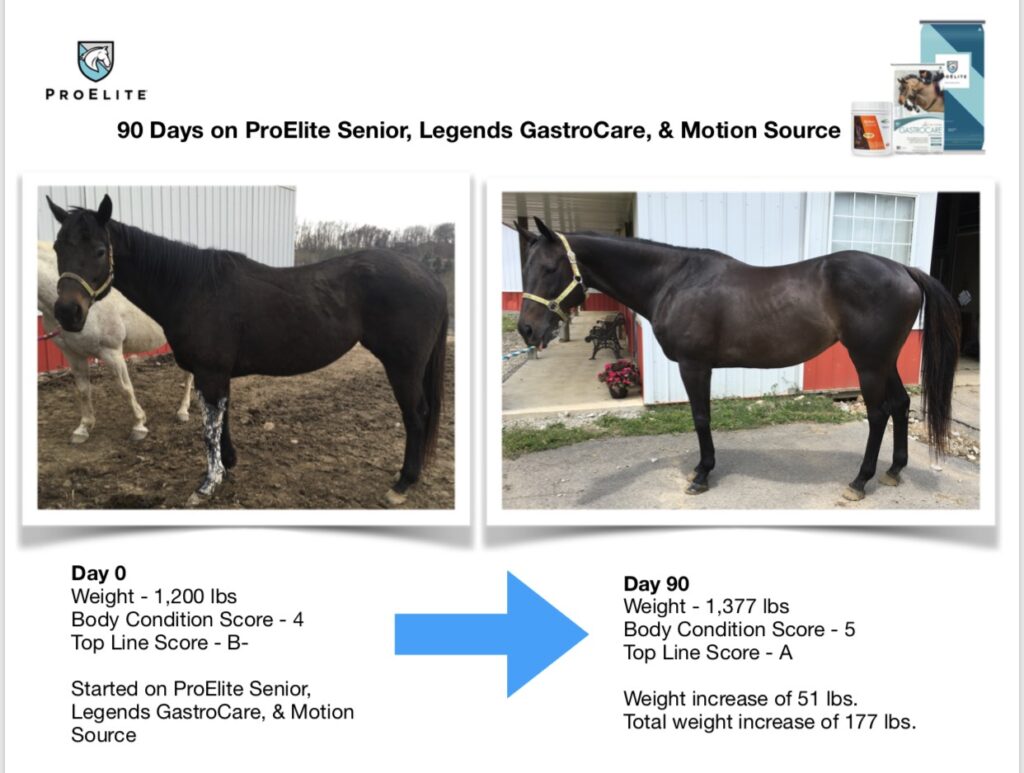Dr. Marty Adams, PhD, PAS – Equine Nutritionist for Cargill/Southern States
With advances in nutrition and preventive health care, today’s horses can expect to have longer and more productive lives than ever before. Many horses are living well into their late twenties and thirties, with a good quality of life. Special feeds have been developed for older horses, which meet their unique nutritional needs and extend their productive lives. A senior horse feed should be highly palatable, dust-free, easy to chew and digest, based on digestible fiber instead of grain, low in sugar and starch content, provide quality protein and with guaranteed levels of essential amino acids, and have added Bcomplex vitamins, added vitamin C, and a high fat content. ProElite Senior is a textured, low sugar/starch, beet pulp/pelleted feed with 10% fat that is very palatable and contains more digestive aids than any senior horse feed. Following are some tips on feeding the
older horse, to help you make the most of your horse’s senior years.
- Schedule regular dental examinations for your older horse. Many horses have sharp points that develop on the edges of their molars that need to be filed down or floated. If hay and feed are not properly chewed, the horse may not be able to digest them well enough to obtain sufficient nutrients. If you notice your horse having trouble chewing, if he commonly drops his feed during mealtime, or he spits out balls of hay or grass, it is time to schedule a visit from the dentist.
- Wet the feed, making a mash or soup for the senior horse. Some older horses have lost enough teeth or their teeth are worn down enough that they are unable to properly chew even senior-type feeds very well. Adding some warm water to the feed and allowing it to set for 15 to 30 minutes before feeding will allow the dentallychallenged horse to chew or swallow its feed better, and reduce the risk of choke and impaction colic.
- Feed your older horse apart from aggressive eaters. If you have several horses grouped together and don’t have stalls to feed them individually, separate your older horse from the group so it can be fed alone. Unless your older horse is the most dominant horse in the group, it is not likely they would be able to consume all of their feed without a more dominant horse moving in and claiming the rest of the feed.
- Select a senior horse feed containing highly digestible fiber sources. Highly digestible sources of fiber include beet pulp, soybean hulls and alfalfa hay. These feed ingredients are easily broken down in the horse’s digestive system, providing more calories and a lower risk of impaction colic than less digestible fiber sources. Feeds for older horses contain more fiber than most conventional horse feeds. Senior feeds can be consumed at higher rates than conventional horse feeds and are designed to replace most of the hay or pasture that the horse would normally consume. Choose a senior horse feed with a high fat level. The older horse easily digests fat in the form of vegetable oil, which is the preferred form of fat for the horse compared to animal fats. Fat is a concentrated source of calories, containing more than twice the calories per unit than carbohydrates, which make up the majority of calories found in grain and hay. ProElite Senior contains 10% fat from soy oil and flaxseed, which are both good sources of omega-3 fatty acids which help to lower inflammation.



